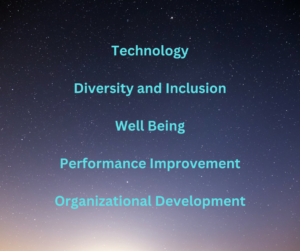
The use of Technology
Technology is increasingly being used in executive coaching, both to facilitate communication between coaches and clients and to provide new tools and resources for clients to use in their development. For example, video conferencing can be used to conduct coaching sessions remotely, and online learning platforms can provide clients with access to a variety of resources, such as articles, videos, and webinars.
There are several benefits to using technology in executive coaching. First, it can make coaching more accessible to clients who live in remote areas or who have busy schedules. Second, it can help coaches to provide more personalized coaching, as they can tailor their sessions to the specific needs of each client. Third, it can help coaches to collect data on client progress, which can be used to measure the effectiveness of the coaching program.
The focus on Diversity and Inclusion
As organizations become more diverse, the need for executive coaches who can help leaders understand and navigate the challenges of leading a diverse workforce is growing. Executive coaches can help leaders develop the skills and awareness they need to create inclusive workplaces where all employees feel valued and respected.
There are several challenges that leaders face when leading a diverse workforce. First, they need to be aware of their own biases and how they may impact their decisions. Second, they need to be able to create a workplace where everyone feels welcome and respected, regardless of their background. Third, they need to be able to manage conflict effectively and build relationships across different cultures.
Executive coaches can help leaders to address these challenges by providing them with training on diversity and inclusion, helping them to develop a more inclusive mindset, and providing them with strategies for managing conflict effectively.

The focus on Well-Being
In today’s fast-paced and demanding world, it is more important than ever for leaders to take care of their own well-being. Executive coaches can help leaders develop healthy habits, manage stress, and build resilience.
There are several benefits to taking care of one’s well-being as a leader. First, it can help leaders to be more effective in their roles. Second, it can help them to avoid burnout. Third, it can help them to live longer and healthier lives.
Executive coaches can help leaders to take care of their well-being by providing them with tools and resources for stress management, sleep hygiene, and nutrition. They can also help leaders to develop a more balanced lifestyle by encouraging them to exercise, spend time with their families, and pursue hobbies.
The focus on Performance Improvement
Executive coaches can help leaders identify and develop their strengths, overcome their weaknesses, and achieve their goals. They can also help leaders develop the skills and strategies they need to be successful in their roles.
There are several benefits to working with an executive coach. First, it can help leaders to identify their strengths and weaknesses. Second, it can help them to develop a plan for improving their performance. Third, it can provide them with feedback and support as they implement their plan.
Executive coaches can help leaders to improve their performance by providing them with tools and resources for goal setting, time management, and decision making. They can also help leaders to develop a more positive mindset and to build stronger relationships with their team members.

The focus on Organizational Development
In addition to working with individual leaders, executive coaches can also work with organizations to help them improve their performance and culture. They can do this by helping organizations develop their leadership pipeline, create a more inclusive workplace, and implement new strategies.
There are several benefits to working with an executive coach to improve an organization’s performance. First, it can help the organization to identify its strengths and weaknesses. Second, it can help the organization to develop a plan for improvement. Third, it can provide the organization with feedback and support as it implements its plan.
Executive coaches can help organizations to improve their performance by providing them with tools and resources for strategic planning, change management, and employee engagement. They can also help organizations to develop a more positive culture and to create a more inclusive workplace.